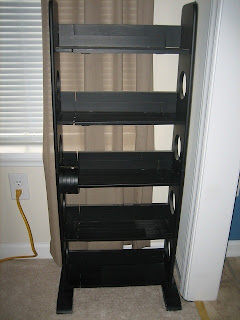At the beginning of last year, Liz started her garden. My role was strictly to build it and then Liz will maintain it. That's how the year went until I butted my head in every now and then to say "you aren't watering enough, it needs more water". So she watered more than how much she felt she should water.
Well the end result was that the year, to me, was about 25% successful. We got a good number of veggies, but all the plants were dead by June/July due to the Summer.
This past weekend we went to our local garden center(Gunters Garden Center) and picked the brain of the owner since we could tell he loved to talk. We quizzed him on so much that it's hard to remember. He basically made us realize we didn't know a lot about what we were doing. Here is the inside scoop on some of the questions we asked, and a rough overview of the answers he gave us:
The question of the day: How much should we be watering? We watered about once or twice a day for a good long while and it didn't help at all.
That's way too much. Everyone asks this and there is no good answer, but in general, EVERYONE waters too much. You rarely see anyone watering too little. When you first plant, you should in general water for 3 seconds every other day. The plant has the roots near the top, you don't need to water long for the plant to absorb the water. After about 2 or 3 weeks, add another day to water every 3 days. And every week or two, keep adding a day until you are finally only watering once a week. The big BUT here, is as you add days, also add seconds to the amount of time you are watering, so that by the time you are watering once a week, you should be watering each plant for about a good 30 seconds or a minute. The reason is that as the plants grow, you want the roots to go way down deep where the water lasts the longest. If you water for a minute, you know that water is going to get down deep, and that's where you want the plant to seek the water.
In addition to that, not only does following that plan build roots that seek water deep down, but it also gives the soil enough time to dry out and gives the plant room to breath. Take a sponge for example, it's a lot like soil. If you keep putting water on it, all the holes are going to have water and no oxygen. But if you let the holes dry out and oxygen gets in, then the plant can breath. Your plants probably couldn't breath at all last Summer, another reason why their root system was insufficient and why the plants didn't produce as much fruits and vegetables.
Our plants didn't survive the Summer heat, why do you think that is?
Well last Summer was unusually hot in the first place, but it's mainly because you were watering so much, your roots never went deep into the ground, and therefore weren't strong enough to survive. If you water less frequent, and force those roots to drive into the ground, you'll have a large root system that can withstand almost anything.
Birds destroyed our tomatoes, what do we do?
Birds hate shiny objects and moving objects, so the more of those you put into the garden the better. So get some of that shiny ribbon and string it from all the posts that hold your tomato plants up. Also get something that moves and have that in your garden like a mobile or something. Enough of that stuff, and you'll drive the birds away.
Other than getting good soil, we didn't fertilize at all, should we?
[laughter] oh yeah, you should definitely fertilize. You can either get the spray Miracle Gro stuff or get the slow release pellets you put in your soil, but you should probably be fertilizing once every 2 weeks if you use the spray stuff.
Does Miracle Gro have any chemicals that are harmful to the environment or us that we shouldn't use on plants?
No, really when it comes down to it, it's all just salt. If you let it sit out and it dehydrates, that's really all it is. Plus all the stuff that's in Miracle Gro is naturally occurring anyway, except you're just putting it on your plants.
We built our garden last year and still have really nice soil, what kind of compost or fertilizer do we need?
What you need depends on how your soil is. If your soil is tough to hoe and is just solid dirt, then you need peat moss and lots of it. After a couple years of peat moss, you should start developing some really nice soil. If you already have nice soil, then just fertilizer or manure is all you really need. (we got 4 bags of manure, yum).
(this one was from me):
What's the hottest pepper plant you sell? That's going to be my baby.
Habaneros, we're just about to seed them and they'll be ready for planting first week in April. We have some other pretty hot ones, but those are the worst by far.
Our yard sucks, how would you go about making a pretty looking lawn?
If you go over to Brier Creek, they have the same problem with their grass that you had with your garden, they water way too much. They water many times a day and all that does is teach the grass that where you'll need water is right at the surface. If they stopped watering in the Summer for 2 days, everything would die, because it has no root system. So you should do the same thing with grass that you do with the garden in regards to watering. But first you start out, early Fall, maybe September, you get a aerator that pulls the plugs out of the ground. That gives your ground some air and deep pockets for grass to grow. Then you lay down a generous number of seeds so they get into those holes. Follow the same watering practices as your garden until the grass is full grown. Then you have to follow a fertilizing plan that feeds every month or two like the Scotts plan. Follow that same routine for about 3 years, and you should have quite a lawn.
So needless to say I'm psyched about the tips he's given me on the yard. I still stand by my opinion that unless you pay someone to fertilize and you get a sprinkler and irrigation system, that you cannot maintain a nice looking yard in NC. The ground is so awful and the Summers are so hot, just seems impossible. BUT, he has given me hope.
All this knowledge has caused the year to start a little differently than last year. Liz has maintained her level of enthusiasm and is eager to get the plants started in early April. I, on the other hand, have flipped from mildly interested last year to almost taking the hoe right out of her hands this past weekend. I am very excited to see what the year holds, and with our new found knowledge I'm confident the garden is going to be bustling with some green (and red, and yellow, and orange etc..) quite soon!







































